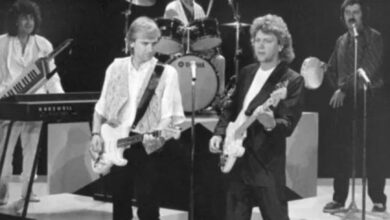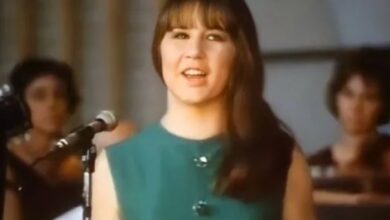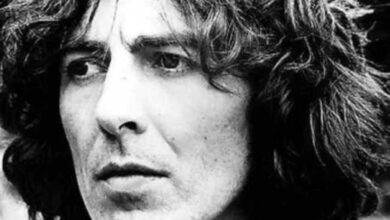George Jones’ “He Stopped Loving Her Today” Resurrects a Legend and Becomes Country Music’s Emotional Pinnacle in 1980
In 1980, amidst the polished sheen of the Urban Cowboy era and country-pop crossovers, one song pierced the noise with raw, heartbreaking sincerity. “He Stopped Loving Her Today,” recorded by George Jones, arrived like a ghost of classic country storytelling—somber, poetic, and unforgettable. With its mournful strings, spoken-word bridge, and devastating twist ending, the track immediately stood apart. It wasn’t just another ballad—it was a funeral in three verses. The song soared to No. 1 on the Billboard Hot Country Singles chart, remained there for 18 weeks, and reignited the fading career of a man once written off by the industry. For many, it didn’t just define George Jones—it defined the genre.
George Jones, often called “the greatest voice in country music,” had built his career through the ’50s and ’60s with hits like “White Lightning” and “The Grand Tour.” Born in Saratoga, Texas, in 1931, Jones grew up singing on street corners and in small honky-tonks, where he developed a voice marked by plaintive vulnerability and emotional control. But by the late 1970s, he had become better known for his personal struggles than his songs. His battles with alcoholism, drug abuse, and missed performances earned him the nickname “No Show Jones.” His career was in decline—until a song about undying love and quiet tragedy brought him roaring back to the top.
The track was written by Bobby Braddock and Curly Putman, two of Nashville’s most revered songwriters. Inspired by themes of eternal devotion and grief, they crafted a story of a man who never stopped loving a woman, even after she left him—and only in death could he finally let her go. The concept was risky: a tearjerker so heavy it bordered on melodrama. But producer Billy Sherrill saw its potential and believed only one voice could carry its weight. He took the song to Jones, who initially scoffed at the idea. “Nobody’s gonna buy that morbid son of a bitch,” Jones reportedly muttered. But after much coaxing, and multiple attempts, the song finally came to life.
The recording process was anything but smooth. Jones was in poor health, both physically and mentally, and was often absent from the studio. Producer Billy Sherrill pieced the song together over several months—recording the spoken bridge at a different time than the verses, using subtle orchestration to frame Jones’ voice without overwhelming it. The final product was haunting: a minimal, sorrowful backdrop of guitar, strings, and pedal steel, with Jones delivering each line as though it were being carved in stone. His phrasing was immaculate, dragging syllables across measures, hesitating just enough to pull the listener into the pain.
When “He Stopped Loving Her Today” was released in April 1980, it was met with awe. Critics hailed it as a masterpiece of narrative songwriting. Fans flooded country radio with requests. The song climbed the charts with ease, dominating the country airwaves and earning Jones the Country Music Association (CMA) Award for Single of the Year—an honor he would win again the following year. It also won him a Grammy for Best Male Country Vocal Performance, cementing the track as both a critical and commercial triumph.
More than just a hit, the song marked a cultural re-centering of country music. At a time when crossover appeal was threatening to dilute the genre’s roots, Jones reminded the world what country could do at its finest: tell stories of the human condition, unfiltered and unsparing. It brought back the traditions of Hank Williams and Lefty Frizzell, emphasizing emotion and simplicity over gloss and trend-chasing. Suddenly, country music was again a place for heartbreak—and no one did it better than George.
Professionally, the song saved George Jones. Its success resurrected his career and gave him a second wind that would carry him through the next two decades. New tours were booked. New albums were greenlit. He was no longer the forgotten legend—he was the man who sang the country song. The track served as the foundation for his acclaimed 1980 album I Am What I Am, which went platinum. It restored not just his place on the charts, but his dignity as an artist.
Its influence reached beyond Jones himself. The song became a gold standard for country ballads—referenced by everyone from Alan Jackson to Garth Brooks as a model of perfect emotional storytelling. It reintroduced the idea that country music could be literary, that its power rested in the quiet tragedies of everyday life. No one needed rhinestones or choreographed line dances to feel something. All it took was a voice, a story, and the right words at the right moment.
Over the years, the song has been covered by artists like LeAnn Rimes, Alan Jackson, and Johnny Cash, each offering their own interpretations but rarely deviating from the song’s mournful gravity. Most versions stay faithful to the original, a testament to how complete and untouchable the recording feels. When Jackson performed it at Jones’ funeral in 2013, it was more than a tribute—it was a closing chapter for the man who had lived, and nearly died, through its words.
The song’s release also coincided with a personal crossroads in Jones’ life. Having hit rock bottom, he began to seek sobriety and stability. Though it would take years, “He Stopped Loving Her Today” became a turning point—proof that redemption was possible. It gave him purpose again. It gave him a reason to keep showing up.
In the decades since its release, the song has become widely regarded as the greatest country song ever recorded. It continues to appear on “greatest of all time” lists and remains a staple of classic country radio. Its timeless themes—love, loss, devotion, and death—resonate across generations. It is the anthem of the brokenhearted, the lonely, the faithful, and the forgotten.
Stylistically, the song changed the conversation about what could be done within a three-minute single. It revived spoken-word storytelling. It embraced slow pacing in an era of up-tempo hits. It proved that restraint could be more powerful than excess. Future country ballads would follow its lead—not by copying its form, but by learning from its sincerity.
After Jones’ death in 2013, the song took on even more gravity. It was played at his funeral, eulogized by peers and fans, and etched into the legacy of American music. It is now more than a hit—it is a monument, a standard against which every heartache ballad is measured.
Ultimately, “He Stopped Loving Her Today” is not just a song—it’s an emotional experience. It encapsulates the full weight of human longing in just a few verses. For George Jones, it was the lifeline that pulled him back from the edge. For country music, it was a compass pointing true north. And for listeners, it remains one of the most soul-stirring performances ever committed to record.





